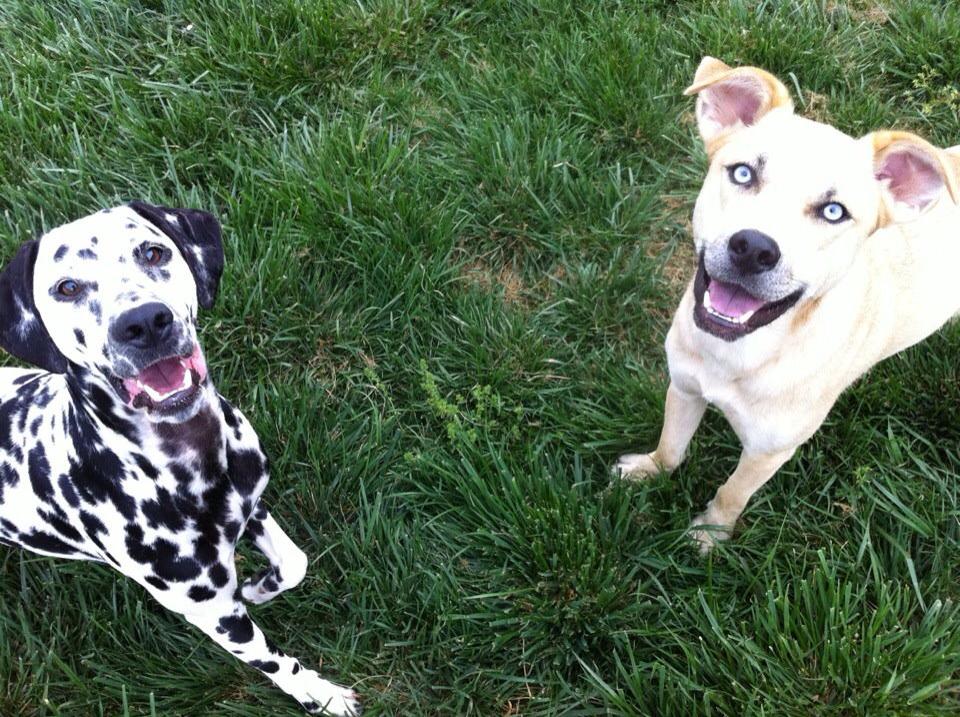An old Kat and New Tricks?
by Kathryn Primm DVM on 02/12/13
Today is my birthday (32 again!!!) and I have had a request to address some of the special needs of the aging pet, so I thought it would be specifically appropriate to write my blog about this today.
It is well known that aging is an expected and natural process. It is not technically a disease. Things just age and break down over time. We can use what we know about body systems and what we know about aging to tweak things to slow the progression a little bit. So here is my educated (and somewhat "up close and personal") opinion on the matter:
Body Weight
Obesity shortens life and speeds up the consequences of aging. This has been shown in scientific studies (Purina's life span study in 2002 found that normal weight Labs outlived their obese counterparts by an average of 1.8 years). It is also common sense to know that one's joints are going to wear more slowly if they bear less of a load. The same study found that the average age of the dogs requiring treatment for a chronic condition was 12 years for the lean dogs versus 9 years for the obese ones. We know from human models that abominal obesity creates extra workload on the heart and the list goes on and on. So keep your senior pet trim and you will reap the rewards of a longer and happier life.
Medical Care
I know it sounds like gratuitous self promotion for me to say "include your vet in your older pets care", but it is astoundingly true. A few years age, I did a retrospective look at our patient records and I found that the average age of death for our patients was almost 12 years. (And you know, of course, that our clients are wonderful and follow our suggestions better than most!) As an educated and objective observer, I can sometimes see things about your pet that you have not noticed being so close. Do not miss frequent physicals on your older pet. We suggest a thorough exam every 6-12 months and routine wellness testing for common age associated diseases once a year. I was involved in a conversation at my son's school the other day. Two of my longterm senior patient owners were talking to a new client with a senior pet also. She was saying how she was astounded that she still has her dog and how they never thought she would live this long (she is 14). One of the long term clients said, "Surprised good or surprised bad? Because if you do not want her to live long, don't go to Dr. Primm!" I was flattered and pleased, but I know it is true. Careful monitoring for older patients does make a difference.
Diet and Supplements
It is true that you are what you eat and so is your pet. Your dog is an omnivore like you are and if you start with a high quality premium diet and add in selected whole foods, you will be doing your dog a service. There are lots of high quality premium foods on the market and if you read this blog, you know that I like Royal Canin diets. My senior Great Dane eats Mobility diet to help with her aging joints. I feel that they have done their due diligence in research to substantiate their claims and I know that since I have been carrying the diets, they have never had a recall. Another thing that I swear by is Omega 3 supplements. Omega 3 supplements have shown promise in reducing inflammation in chronic skin conditions and improving joint lubrication. Some human studies suggest a decrease in cancer-associated inflammation also.
So, premium pet food base diet and supplement with whole, low fat choices and pet formulated omega 3 supplements. I do not recommend giving human supplements to pets and always give my
pets the ones that are formulated and tested for their specific
species. Cats are not tiny dogs, any more than dogs are tiny humans. When it comes to food choices to share with your pet, here is my rule: If you would not eat it or would not want your doctor to know you ever ate it, do not give it to your pet. This includes things that are downright toxic to pets like chocolate, but also fatty things like ground meat, BBQ and food that is potentially spoiled (like when you clean the refrigerator out and give stuff that is iffy to the dog). Good choices (IN MODERATION) might include: Whole grain breads, vegetables, like squash or green beans and some fruits for your dog and stick to lean meats for your cat.
Dental Care
We know that dental infections spread to the liver and heart, but also that dental disease is very painful. If you want your pet to live long and prosper, don't ascribe to the notion that bad breath is ok for pets. It isn't. If the breath is bad, there is infection. I believe that our aggressive dental program is a big part of our impressive longevity numbers. Let your vet flip your pet's lip and tell you what is needed. It makes a difference.
So if you are hoping that your pet will be there with you for years to come, read and follow this blog. Ask me questions and submit comments. Start reading labels and be selective for your pet. Have him/her evaluated by a vet for body condition score and wellness testing. Make sure she does not have visible tartar and bad breath. Aging is a natural process, but we do not have to take it lying down!







